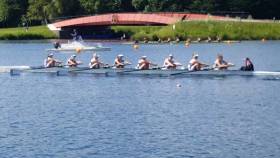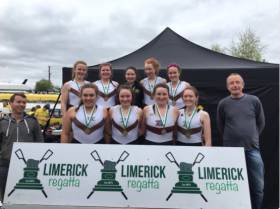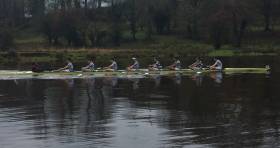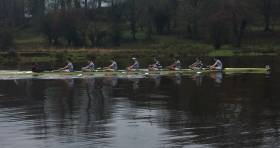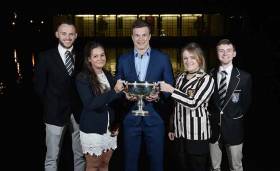Displaying items by tag: UCD
NUIG Women's Eight Impress At Metropolitan Regatta
#Rowing: Irish crews had a very successful second day at the Metropolitan Regatta at Dorney Lake. Monika Dukarska of Killorglin and the Skibbereen double of Denise Walsh and Aoife Casey won in the top single and double sculls races, but other crews also impressed. NUIG’s women’s eight finished third in the A Final in Tier One – the crew, which has a number of novice rowers, had also taken third in the morning time trial. Trinity, UCC, Shandon, Galway, Cork and UCD were amongst the crews which also came away with encouraging results over the weekend.
Metropolitan Regatta, Dorney Lake, Day Two (Selected Results; Irish interest)
Men
Eights – Tier One, Final B: 2 NUIG A, 3 UCD (A). Final C: 1 Trinity 6:07.65. Final D: 2 UCD. Final F: 1 NUIG (B) 6:25.61. Final I: 2 Trinity (D), 3 UCD (C).
Four – Tier Three Final: 1 UCC 6:36.53.
Four, coxed – Championship Final: 3 NUIG (B).
Pair – Tier Two Final: 2 UCC
Sculling, Double
Tier Two Final: 2 Shandon
Women
Eight – Tier One – Final A: 3 NUIG (A). Final B: 2 Commercial. Final C: 3 Galway. Final D: 2 NUIG.
Four, coxed – Tier Three: 3 Galway Rowing Club.
Pair - Tier One Final: 2 Cork (G Collins, L Dilleen)
Sculling, Double – Tier One Final: 1 Skibbereen 7:17.56.
Single – Tier One: 1 Killorglin (M Dukarska); 3 UCD (A Crowley).
UCD Senior Eight the Afloat Rowers of the Month
#Rowing: The Afloat Rowers of the Month for April are the UCD men’s senior eight. The crew, stroked by David O’Malley, beat Commercial, the champions of Ireland, at Skibbereen Regatta. They went on to Trinity Regatta and beat the hosts with another fine performance.
The winning crew at Skibbereen Regatta was: Sam Bolger, Shane O’Connell, Tiarnan Doherty, Max Murphy, Shane Mulvaney, Andrew Griffin, Eoin Gleeson, David O’Malley, Orlagh Reid (cox). James O’Sullivan replaced Shane O’Connell in the crew for Trinity.
Rower of the Month awards: The judging panel is made up of Liam Gorman, rowing correspondent of The Irish Times, and David O'Brien, editor of Afloat magazine. Monthly awards for achievements during the year will appear on afloat.ie. Keep a monthly eye on progress and watch our 2017 champions list grow.
Cork Boat Club and Clonmel's Lynch Excel at Limerick
#Rowing: Cork Boat Club had a good day at Limerick Regatta at O’Brien’s Bridge today. They won the the men’s intermediate eight and senior pair and the women’s junior 18 eight. UCD won the women’s novice eight and Daire Lynch of Clonmel, who won the single sculls time trial in a very fast time (five minutes and nine seconds), went on to take the senior and intermediate singles titles.
Limerick Regatta, O’Brien’s Bridge (Selected Results)
Men
Eight – Intermediate: Cork. Club: Neptune. Jun 18: Neptune. Masters – Final One (b-c): St Michael’s A. Final Two (d-e): Athlone. Jun 16: Col Iognaid.
Four – Sen: St Michael’s. Inter, coxed: Cork. Jun 18A, coxed: St Michael’s.
Pair – Senior: Cork. Jun 18: Clonmel.
Sculling
Quad – Sen: Carlow. Nov, coxed: UCC. Jun 18A: Carlow. Jun 16, coxed: CRCC.
Double – Inter: Castleconnell B.
Single – Senior: Clonmel (D Lynch). Inter: Clonmel (D Lynch). Jun 18A: Clonmel (A Butler). Jun 16: Castleconnell (R O’Neill). Masters – Final One: Lady Elizabeth (B Smyth). Final Two: Cork (B Crean). Final Three: Galway (A McCallion).
Women
Eight – Nov: UCD. Jun 18: Cork. Jun 16: St Michael’s.
Four – Sen: Shannon. Inter, coxed: Shannon. Jun 18: Col Iognaid.
Pair – Sen: Fermoy. Jun 18: Fermoy.
Sculling
Quadruple Novice, coxed: Cappoquin. Jun 18: Cork. Jun 16, coxed: Killorglin. Masters, coxed: Univ of Limerick
Double – Inter: Carlow.
Single – Inter: Garda (B Larsen). Jun 18A: Carlow (C Nolan). Jun 16: Cork (C O’Sullivan). Masters: Offaly (C Nolan).
UCD's Senior Eight Impress in Final Flourish
#Rowing: UCD’s senior eight beat Trinity by two and a quarter lengths at Trinity Regatta today. The very strong crew, stroked by David O’Malley, fashioned a lead after the second bend and held off the hosts. This may be the last time this crew rows together competitively as O’Malley, Shane Mulvaney and Shane O’Connell (who did now row at Trinity) will be called up for international duty.
In a cracking junior 18 eight final, Commercial just pipped neighbours and rivals Neptune. Garda’s Damien Kelly and Piers Ryan won the senior doubles race. Commercial, who won the women’s senior eight, also took the women’s junior 18 eight.
Trinity Regatta, Islandbridge (Selected Results)
Men
Eight – Senior: UCD bt Trinity, 2 ¼ l. Club: Trinity bt UCD did not finish. Inter: UCD bt Cork BC row over. Novice: Queen’s bt Trinity easily. Junior: Commercial bt Neptune half canvas. Masters: Neptune bt Commercial ½ l.
Four – Inter, coxed: UCD bt Cork row over. Club, coxed: Neptune bt UCD A disq. Masters, coxed: Neptune bt Graiguenamanagh easily. Junior, coxed: Commercial bt Neptune row over.
Pair – Senior: UCD bt KSRV Nord easily
Sculling,
Quadruple – Nov, coxed: Commercial bt Sligo easily. Jun 18B, coxed: Commercial bt Blackrock easily. Jun 16: Commercial bt Three Castles 2l.
Double – Senior: Garda bt Tralee/Shandon 3/4l
Single – Inter: Sligo (Patterson) bt Commercial (Casey) easily. Club One: Portadown (N Hull) bt Shannon (C Carmody) 2 ½ l. Jun 18: Neptune (J Butler) bt Commercial (K Brown) 4l. Jun 16: Three Castles (Keogh) bt Three Castles (Flynn) easily. Masters: Athlone bt Commercial 3l.
Women
Eight – Senior: Commercial bt Trinity 3 ½ l Club, coxed: Commercial bt Trinity 2l. Nov: Trinity A bt KSRV Njord 2l. Jun 18: Commercial bt Graiguenamanagh easily. Jun 16: Graiguenamanagh bt Athlone easily.
Four – Inter, coxed: Trinity B bt Trinity A 1l. Club, coxed: Commercial B t Commercial A 3l.
Sculling – Quadruple – Novice, coxed: Commercial bt UCD easily.
Double - Senior: Neptune bt KSRV Njord easily.
Single – Inter: Neptune (Feerick) bt Athlone (Curley) easily. Club: Neptune (A Clark) bt Garda (J Ryan) 3l. Nov: Commercial (Ballot) bt Graiguenamanagh (B Hennessy) 3l. Jun 16: Neptune (Clarke) bt Neptune (Daymon) 2l.
Commercial Women's Eight Beat Hosts at Trinity Regatta
#Rowing: Commercial beat Trinity in the women’s senior eights at Trinity Regatta today. Commercial were the more powerful crew and once they took the lead the held it to win by three and a half lengths. UCD’s senior men’s pair came out on top, while Jack Butler of Neptune was the top junior single sculler.
Trinity Regatta, Islandbridge (Selected Results)
Men
Eight – Club: Trinity bt UCD did not finish. Inter: UCD bt Cork BC row over. Masters: Neptune bt Commercial ½ l.
Four – Club, coxed: Neptune bt UCD A disq. Masters, coxed: Neptune bt Graiguenamanagh easily. Junior, coxed: Commercial bt Neptune row over.
Pair – Senior: UCD bt KSRV Nord easily
Sculling,
Quadruple – Nov, coxed: Commercial bt Sligo easily. Jun 18B, coxed: Commercial bt Blackrock easily. Jun 16: Commercial bt Three Castles 2l.
Single – Inter: Sligo (Patterson) bt Commercial (Casey) easily. Jun 18: Neptune (J Butler) bt Commercial (K Brown) 4l.
Women
Eight – Senior: Commercial bt Trinity 3 ½ l Club, coxed: Commercial bt Trinity 2l. Nov: Trinity A bt KSRV Njord 2l. Jun 16: Graiguenamanagh bt Athlone easily.
Four – Inter, coxed: Trinity B bt Trinity A 1l. Junior, coxed:
Sculling – Double - Senior: Neptune bt KSRV Njord easily.
Single – Inter: Neptune (Feerick) bt Athlone (Curley) easily. Club: Neptune (A Clark) bt Garda (J Ryan) 3l. Jun 16: Neptune (Clarke) bt Neptune (Daymon) 2l.
UCD The Top Eight at Skibbereen Regatta
#Rowing: UCD won the men’s senior eights at Skibbereen Regatta today. They led Commercial with 500 metres to go and the Irish champions could not head the men in blue and saffron. The senior women’s eight was won by a Skibbereen/UCC composite which drove away from their opponents impressively over the final 100 metres.
Skibbereen Grand League Regatta, National Rowing Centre (Selected Results; with Per Centage of Projected World Gold Medal Winning Time)
Sunday
Men
Eight – Div One – A Final: 1 UCD (sen) 5:44.4 (92.62), 2 Commercial (sen) 5:46.3 (92.13), 3 UCD (inter) 5:54.9 (89.9); 5 Enniskillen (jun 18A) 6:00.6 (88.46). B Final: 2 St Michael’s (club one) 6:04.3 (87.57). Four - Div One – A Final: 1 Commercial (sen) 6:16.1 (90.40), 2 NUIG (sen) 6:25.1 (88.28), 3 Commercial B (sen) 6:26.9 (87.89). Div Two (coxed) – A Final: 1 Queen’s A (club two) 6:50.5; 5 Shandon (jun 16). B Final: 1 Commercial (jun 18B) 7:06.6.
Sculling,
Quadruple – Div Two, coxed – A Final: 1 Carlow (jun 18B) 6:52.4, 2 Shandon A (jun 16) 6:54.4, 3 Lee (club two) 6:56.5; 6 Queen’s (nov) 7:11.6.
Double – Div One – A Final: 1 Skibbereen, UCD (G O’Donovan, P O’Donovan; sen) 6:27.8 (92.83), 2 Skibbereen (M O’Donovan, S O’Driscoll; sen) 6:29.4 (92.64), 3 Skibbereen B (sen) 6:31.4 (91.98). B Final: 1 Shandon (inter) 6:42.3 (89.48); 3 Shandon A (jun 18A) 6:53.0 (88.03). C Final: 5 Carlow (club one) 7:01.4 (85.42).
Single - Div Two – A Final: 1 Shandon (J Dorney; jun 16) 7:34.6, 2 Cork (C O’Sullivan; jun 18B) 7:41.1, 3 UCC (J Larkin; club two) 7:48.2.
Women
Eight – Div One – A Final: 1 Skibbereen/UCC (sen) 6:32.3 (89.97), 2 NUIG (inter) 6:36.6 (89.01), 3 Commercial (sen) 6:41.3 (87.96); 5 Cork BC (club one) 6:50.9 (85.92); 6 Col Iognaid (jun 18A) 7:10.4 (82.01).
Four – Div One – A Final: 1 UCD (sen) 7:07.1 (88.04), 2 Skibbereen A (sen) 7:13.4 (86.75), 3 Commercial A (sen) 7:17.4 (85.96); 5 Enniskillen (jun 18A) 7:18.9 (85.67). Div Two, coxed – A Final: 1 Skibbereen (club two) 7:34.3; 6 Col Iognaid (jun 16) 8:06.6. B Final: 2 Shandon (jun 18B) 8:31.0.
Sculling
Double – Div One – A Final: 1 Old Collegians, Cambridge (S Puspure, C Lambe; sen) 7:09.7 (92.40), 2 Lee, Skibbereen (sen) 7:26.6 (88.90) 3 Neptune (inter) 7:42.2 (85.9), 4 Workmans B (jun 18A) 7:42.5 (85.84). B Final: 3 St Michael’s (club one) 7:56.1 (83.39).
Single – Div Two – A Final: 1 Lee Valley (E O’Mahony; club two) 8:22.3, 2 Lee Valley (E Buckley; jun 18B) 8:28.6; 5 Neptune (N Clarke; jun 16) 8:46.1
#Rowing: Trinity came out on top at the Irish University Rowing Championships at the National Rowing Centre in Cork today. The combined points tally of Dublin University Boat Club and Dublin University Ladies Boat Club was 68 points. UCD’s total was 51 and NUIG’s 43.
The Wylie Cup, calculated on results in the men’s eights, went to UCD, who won the senior eight convincingly from Trinity. NUIG are the Bank of Ireland champions, though UCD won the senior eights.
Stephen O’Connor of UCC beat Patrick Moreau of Trinity in the senior single sculls final, though Andrew Goff of UCD was faster in winning the intermediate title.
Irish University Championships, National Rowing Centre, Friday (Selected Results)
Overall: 1 Trinity (DUBC and DULBC) 68 points, 2 UCD 51, 3 NUIG 43. Wylie Cup (Senior Men, based on results in eights): UCD. Bank of Ireland Cup (Senior Women, eights): NUIG.
Men
Eight – Senior: 1 UCD 6:12.06, 2 Trinity 6:17.82, 3 NUIG 6:26.67. Club: NUIG 6:28.85. Intermediate: UCD 6:17.73. Novice: Queen’s 6:29.09.
Four – Sen: Trinity 7:12.30. Inter, coxed: Dublin IT 7:04.65. Club, coxed: NUIG 7:10.88.
Pair – Sen: Trinity 7:22.44.
Sculling, Quadruple – Nov, coxed: Queen’s A 7:37.40.
Double – Inter: UCC 7:28.18.
Single – Sen: UCC (S O’Connor) 7:58.23. Inter: UCD (A Goff) 7:47.90.
Women
Eight – Senior: 1 UCD 7:06.78, 2 NUIG 7:14.70, 3 Trinity A 7:20.66. Inter: NUIG 7:11.87.
Club: NUIG 7:12.84. Novice: NUIG 7:26.53.
Four – Sen: UCD 7:36.88. Inter, coxed: UCC 8:13.49. Club, coxed: Queen’s 8:12.59.
Pair – Sen: UCD 8:20.97.
Sculling, Quadruple – Nov, coxed: Queen’s 9:08.74.
Double – Inter: Trinity 8:35.31.
Single – Inter: UUC (K Shirlow) 8:46.18.
UCD Give Trinity a Fright at Neptune Regatta
#Rowing: Trinity’s senior eight won at Neptune Regatta – but only just. UCD, with less than a full-strength crew, stormed back at their rivals coming up to the finish and lost by just half a canvas. Commercial beat the hosts in the men's junior eight and also won the women’s club one eight. An Islandbridge eight beat a crew from Dutch club Nereus in an invitational eights event.
Neptune Regatta, Islandbridge, Saturday (selected results)
Men
Eight – Senior: Trinity bt UCD ½ canvas 3:24. Club One: Trinity bt Neptune A 2l, 3:30. Novice: UCD A bt Trinity A disqualified. Jun 18: Commercial bt Neptune ½ l 3:30. Jun 16: Blackrock bt Methody 1l, 4:10. Masters: Commercial bt Neptune 1 1/2 l
Four - Sen, coxed: Trinity A bt Trinity B 3/4l 3:45. Inter, coxed: UCD B Bt UCD A 1l 3:37, Jun 18, coxed: Commercial bt Clonmel 1 1/2 l 3:50
Sculling, Quadruple – Club Two, coxed: New Ross bt Graiguenamanagh. Jun 18: Enniskillen bt Methody 4:12. Jun 16, coxed: Enniskillen bt Blackrock A 1 ½ l 4:08. Double – Jun 16: Three Castles bt Bann A 3 ½ l, 4:16.
Women
Eight, Club One: Commercial bt Belfast RC A 2l 4:15. Nov: UCD bt Trinity B easily 4:15. Jun 18: Commercial bt Galway 1l 4:09. Jun 16: Enniskillen A bt Athlone easily
Four - Sen, coxed: Commercial A bt Commercial C 1 1/2 l 4:20. Inter, coxed: Commercial bt Galway 2 ¾ l, 4:22. Club One, coxed: Cork BC bt Belfast A r/o.
Sculling, Quadruple – Club Two, coxed: Clonmel bt Neptune D 4l 4:28. Jun 18: New Ross bt Kings Hos 2l 4:20
London Head Cancellation Hits Irish Crews Hard
#Rowing: The Eights Head of the River in London, which was set to take place tomorrow (Saturday) has been cancelled. In the a statement, the organisers said: “The Committee have been monitoring the weather forecast over the last few days and due to the strength and direction of the wind and in light of the difficulties encountered at yesterday’s Schools Head, we have reluctantly taken the decision to cancel this year’s race on the safety grounds.
“We recognise and understand the disappointment that this will cause for all competitors and others due to be involved in the race, however safety simply must come first.”
Ireland would have been strongly represented at the event, with Commercial, UCD, Trinity and Neptune all entered. A big number of rowers were already in London or travelling when the announcement was made.
UCD Start on South Station For Gannon Cup Showdown
#Rowing: Trinity won the toss for both the Corcoran Cup women’s race and Gannon Cup men’s contest at the Colours Races this weekend on the Liffey. Trinity opted to take the North Station in both cases. The toss was performed by Josh Van Der Flier, the international rugby player. The races are set for Saturday, March 18th, on the Liffey from O’Connell Bridge to St James’s Gate.
Novice women (Sally Moorhead Trophy) 1.30pm
Novice men (Dan Quinn Shield) - 2pm
Senior women (Corcoran Cup) - 2.30pm
Senior men (Gannon Cup) - 3pm
UCD Senior Women's Crew:
Cox - Síne Ní Fhinn
Stroke Eimear Lambe
7 Ruth Gilligan
6 Jane Coleman
5 Daisy Callanan
4 Gersende Youl
3 Rachel Ryan
2 Vanessa Connolly
Bow Sarah Matthews
UCD Senior Men's Crew:
Cox - Orlagh Reid
8 David O'Malley
7 Eoin Gleeson
6 Andrew Griffin
5 Shane Mulvaney
4 Max Murphy
3 Tiarnan Doherty
2 Shane O'Connell
1 Sam Bolger
DULBC
Sally Moorhead (novices)
1. Bow: Kathryn Yeow
2. Ellen Murphy
3. Molly Brennan
4. Pheobe Warren
5. Aideen Fay
6. Gabrielle Giuscitte
7. Anna Mangan
Stroke: Jane Hogg
Corcoran Cup (seniors)
1. Bow: Susie O‘Neill
2. Nora Fisher
3. Gemma Foley
4. Aoife Corcoran
5. Caoimhe Dempsey
6. Hannah McCarthy
7. Sarah Higgins
8. Laura Walsh
DUBC
Gannon Cup (Senior)
Cox Conor Keogh
Stroke Mark Quigley
7 Adam Browne
6 Patrick Moreau
5 Liam Hawkes
4 Matthew Mitchell
3 Josh Norton
2 Andrej Liadov
Bow William Doyle
Dan Quinn (Novice/Junior)
Cox Hannah Colgan
Stroke Ross Layden
7 Andrew Burgess
6 Paul Peters
5 Constantine Knauer
4 Brian Egan
3 John Taaffe
2 Gavin Moore
Bow Paulus Heemskerk


























